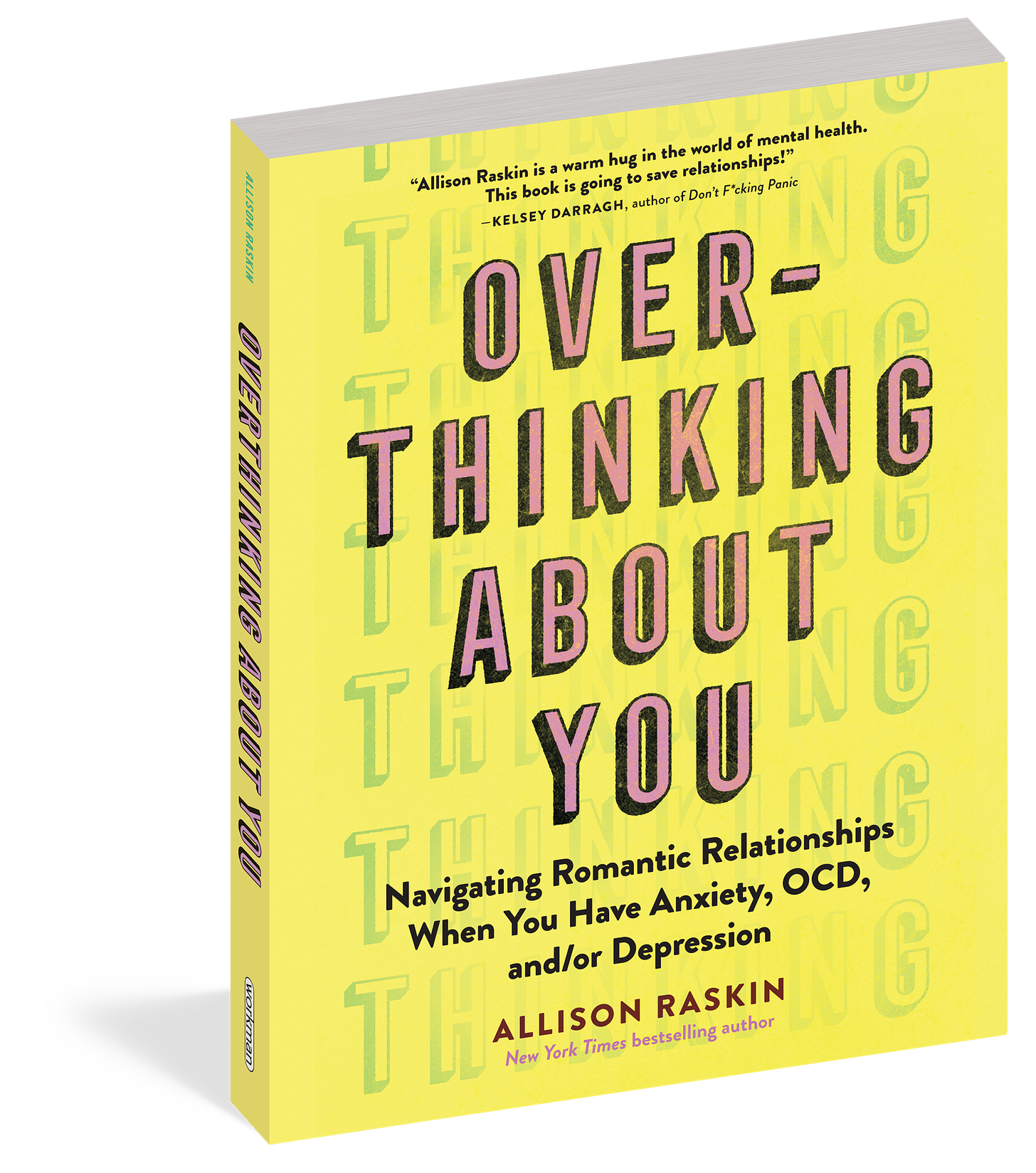If you’re single, you already know that dating is pretty hard. But according to new data from PEW, it seems like the pandemic has made it even harder.
Part of the problem with dating is that pretty much everyone has a constellation of mental illnesses now and that putting two (or more!) traumatized people together during an unprecedented moment of uncertainty takes the casual out of dating.
But here’s the hopeful part: despite the pandemic making dating harder, it also made people want to find “the one” more, not less. People under 30 are the group most likely to say that the pandemic made them want to have a long-term relationship more and interestingly, single men are now more interested (twice as interested to be exact) in being in a committed relationship than single women. So there’s definitely an intensified desire to meet a soulmate despite all the new roadblocks.
Thankfully New York Times bestselling author Allison Raskin wrote a new book to satisfy all our neurotic impulses to sabotage ourselves or our relationships and help us grow from them. Overthinking About You: Navigating Romantic Relationships When You Have Anxiety, OCD, and/or Depression is a comedic yet deeply soothing guide to dating when you feel nuts. Her heartfelt advice is helpful to anybody regardless of relationship status. Whether you’re trying to stop ruminating about your ex or the person who ghosted you or just be a better parter in your current relationship, her compassionate guidance is useful to navigate the raw rollercoaster of emotions that come with being alive in 2022. She’s offered a sneak peak of her book for our community by answering a few questions. It’s out right now and I really recommend you get your hands on it.
The following is my lighted edited transcript from questions that I sent to Allison:
Liz Plank: Single people are spending so much time on all the apps and it can be rough. What is the biggest mistake people make when online dating?
Allison Raskin: I think people tend to take other people’s actions personally, which makes sense until you realize this stranger can’t reject you in any meaningful way because they don’t actually know you! So, it can be helpful to remember you have no idea what is going on with them or what context is influencing their decision making.
I also think it is a mistake, if you are looking for a committed relationship, to not invest time and effort into building a profile that accurately represents who you are. That can take work and some uncomfortable photo shoots, but finding a partner is a big undertaking and it is worth the effort! There is no point spending a bunch of time on apps if you aren’t spending that time productively.
Liz Plank: People disappearing on each other has increased dramatically in our relationships and in the dating world. What is your advice for someone who has been ghosted?
Allison Raskin: Devyn Simone, an amazing dating coach and matchmaker that I interviewed for the book, had a great take, which was that you basically need to make up a story that they were abducted by aliens and then move on with your life. I know that might sound a bit glib, but it’s actually a useful approach. What’s not helpful is to ruminate about why you were ghosted because you are never going to get a satisfying answer. Instead, I would take their hurtful actions as proof that this is someone who doesn’t deserve your time or energy. Ghosting you shows that they lack maturity and communication skills and that’s something you don’t want in a partner anyway!
Liz Plank: A lot of single people are going on some great dates but instead of focussing on having a good time, they’re comparing every new potential partner to an ex they can’t stop thinking about. What's your advice for someone who can't stop let go of their ex?
Allison Raskin: I think it can be helpful to remind yourself of the negative aspects of the relationship while remembering that we are all compatible with many different people. It’s not that you need to be with that specific person, despite what your brain might be telling you. What you really want is to find someone who makes you feel loved, heard and uplifted—and there are plenty of people who would happily fill that role. It’s likely you might be missing the feeling of connection more than the actual person. I also like to point out that you probably don’t even know that person anymore. You are different and so are they. So, in a way, you are longing for a person and relationship that no longer exists in your current reality. Your time is better spent on real options.
Liz Plank: What is your best heartbreak or breakup hack?
Allison Raskin: I think there are two big hurts that come with heartbreak. The first is the sheer pain and grief that comes with losing someone you love. And the other is the sting of rejection. I’ve found it really helpful to focus on the grief instead of ruminating and beating yourself up over the rejection. Losing someone is always going to be painful but you don’t need to make things worse by attacking yourself for “not being good enough” or “not being worthy of love” when really all that happened was you found out you weren’t long term compatible with one other person on this enormous planet. Honor that loss and pain but don’t unnecessarily add to it by seeing it as a reflection of your worth.
Liz Plank: In your book you talk about how we shouldn't pursue perfect relationships, we should be more realistic about how conflict and disagreement is inevitable. But how do we know if we should stay or leave?
Allison Raskin: I think it can help to break down what your concerns actually are and be able to verbalize them. If they are tangible problems in the relationship such as you don’t spend enough time together or your fights tend to spin out of control, I think it’s important to bring these concerns to your partner. Tell them that you want to work on things and see how they respond. Are they willing to hear you? Are they willing to try to create new and healthier patterns? If they are, then I think it is worth sticking it out and trying to create a more fulfilling relationship together. But if you bring up your concerns and your partner ignores them or blames you for their existence without taking any accountability, that is a signal that life with this person is going to be hard and they might not be capable of the type of partnership you ultimately want.
Liz Plank: In your book you talk about how it's not our partner's job to manage our mental health. How do we make sure we are taking responsibility rather than depending on our partner not to trigger us? And again, how do we know if our partner is the right fit for our mental health challenges?
Allison Raskin: If you struggle with your mental health, it’s really important to be with someone who understands that and respects the ongoing work you do to manage it. They need to view your mental wellbeing as a priority. That means they respect you going to therapy or being on medication if that’s a part of your life. You don’t want to be with someone who is judgmental about the mental health field in general or views your symptoms as something you can “snap out of.”
In terms of whose job it is to manage your mental health, it’s helpful to view yourself as your primary helper and your partner as your secondary helper. They are there to offer support and a shoulder to lean on, but you are ultimately the person driving the car. And that often includes explicitly telling your partner how they can best support you instead of expecting them to magically know to do it on their own. We all need different things when we are struggling and being able to share what your specific needs are is crucial and will only help your partnership and your well-being.






Love this. Having just gone through a painful breakup (my first big relationship after the end of my long marriage) lots of this rings true. Also in my work as a coach, we tell clients to focus more on what they want, than what they are trying to escape. However so many women have been conditioned to detach from their desires. They believe thinking about what they want is frivolous and find it very uncomfortable, especially those who tend to be anxious people pleasers. So I suggest collecting data, not judgements. Every swipe, every chat, every date gives you data to help you get clearer on what you actually want. Good luck out there!
Really good and really helpful. Thanks for shining a light on this.